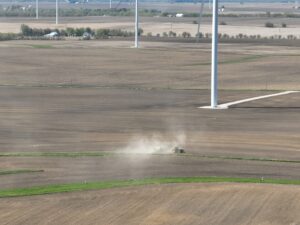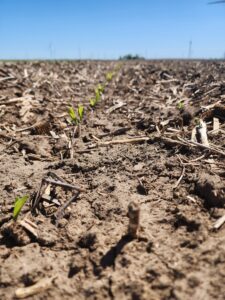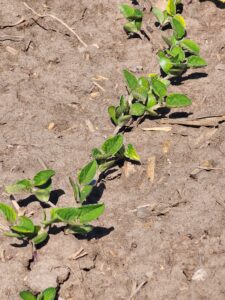Illinois Crop Update – May 5, 2023
Nick Seiter – Extension Field Crops Entomologist, University of Illinois
Champaign County
Soil Conditions: Mildly Dry
Reports of insect activity so far have focused on large/early flights of black cutworm and true armyworm, likely helped along by storms out of the southwest a couple of weeks ago. Both species are more likely to be a problem if dense vegetation is present in the field; black cutworms are especially attracted to winter annual weeds, while armyworm prefers dense grassy vegetation. Be on the lookout for seedling pests (including seed corn maggot, slugs, wireworms, etc.), which can become a problem when cool conditions delay emergence.
Dennis Bowman – Extension Digital Agriculture Specialist
Macon County
Soil Conditions: Mildly Dry
On May 3rd, on a crossroad survey of a 60-mile loop across northern and eastern Macon County, 80 percent of fields were planted. Corn emergence out-paced soybean emergence by about 6 to 1. The ratio varied greatly by neighborhood. The only field activity observed was widely scattered planting, dust clouds made it easy to spot.



Doug Gucker – Extension Educator, Local Food Systems and Small Farms
Dewitt, Macon, and Piatt Counties
Soil Conditions: Mildly Dry
In my area of DeWitt, Macon and Piatt counties, farmers are over 95% complete with corn and soybean planting. Recent cool temperatures have slowed crop emergence. Crops planted between April 6 – 14 have emerged with a few fields of corn at V2 and a few soybean fields at V1. At my location, I have trapped large numbers of True Armyworm moths, which may become an issue in wheat as we approach the second half of May.
Nathan Johanning – Extension Educator, Commercial Agriculture
Monroe County
Soil Conditions: Moderately Dry
Like many we are very dry. Despite the cool weather, the last few fronts that have passed through over the last few weeks have not left much more than a few tenths of rain. That coupled with the windy conditions, has really dried things out. We are on the downhill side of full season corn and soybean planting with the only major slowdown in planting has been some cooler weather, however, that pattern is supposed to break for more spring-like temperatures. There are some corn and soybean fields up, but just barely enough that you can row them from the road. Even the earliest planted has been very slow to emerge with the cool weather and lows still dropping to near 40 degrees some nights. Wheat is appreciating the dry weather and modest temperatures and is looking very good. Hopefully, we will catch some rain here in the next week!
Talon Becker – Extension Educator, Commercial Agriculture
Franklin County
Soil Conditions: Mildly Wet
Wheat stands in south-central Illinois look good overall. There is some unevenness in plant heights visible across fields, which is fairly normal for the relatively flatter fields in that area, for this stage of wheat growth, and for this time of year. But the stands look good in general. Most fields I walked through or observed from the road are at or near boot stage with some in the early heading stages. Farmers are also making progress with spring planting, although very little has emerged due to the cool temperatures over the past few weeks. Also, with somewhat wetter conditions relative to much of the rest of the state, field operations have not taken place in many low-lying and/or poorly drained fields. With a rainy week ahead, some of those fields may remain unplanted for a bit longer.





